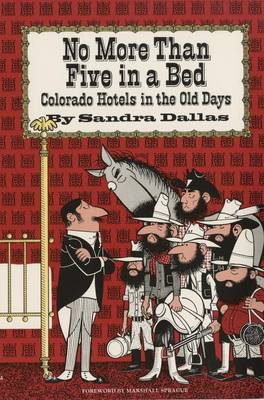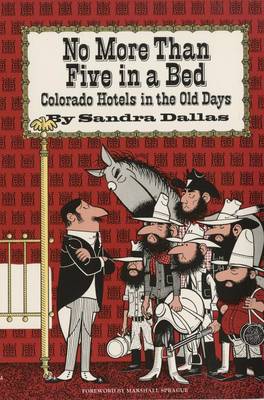
- Afhalen na 1 uur in een winkel met voorraad
- Gratis thuislevering in België vanaf € 30
- Ruim aanbod met 7 miljoen producten
- Afhalen na 1 uur in een winkel met voorraad
- Gratis thuislevering in België vanaf € 30
- Ruim aanbod met 7 miljoen producten
Zoeken
€ 28,95
+ 57 punten
Omschrijving
Here is the story of Colorado's old hotels-some lavish, some lascivious, a few just long forgotten. Before the turn of the century, when travel was arduous, not to mention downright dangerous, voyagers to the Rocky Mountains wanted to lower their travel-weary limbs into plush chairs, nibble oysters, and sip champagne. No luxury was denied them when they arrived at most Colorado hotels. At the Hotel de Paris in Georgetown, for example, an unexpected guest might dine on wild game, tiny French peas, crusty French bread, and properly chilled wine after only a few minutes' wait. At the Sheridan in Telluride a heartier traveler could sit down to a plank steak, named after the piece of wood whose size it resembled. At the Teller House in Central City one could order buffalo tongue in aspic. At Gold Hill, where the miners knew good food if not good French, one could select from Casey's "Tabble Dote" a cup of coffee "demy tass" and "floatin' Ireland." To the eastern visitors' happy surprise, the hotels for the most part were opulently Victorian, as proper as they were in Boston or Saratoga, with ladies' entrances, ordinaries, and endless private parlors. Yet there was still enough of the raw frontier in hotels where a miner might sleep an eight-hour shift on someone else's sheets for a mere fifty cents. He would sleep in the cold, clawed by a bedmate's spurs and chewed by bedbugs, but he did have one guarantee of relative comfort-the landlord's posted promise of "No More Than Five in a Bed." "Both entertaining reading and a most useful guide."-Denver Post "Every page makes entertaining reading."-Dallas News "Amusing and informative and a fine way to fill an evening."-Chicago Tribune "The book is light, frothy and pleasant to read."-St. Louis Post Dispatch Sandra Dallas, a reporter for Business Week for twenty-five years, is the author of Colorado Ghost Towns and Mining Camps, Cherry Creek Gothic: Victorian Architecture in Denver (also published by the University of Oklahoma Press), Gaslights and Gingerbread, many other books and articles on Colorado and the West, and several best-selling novels. Marshall Sprague was a well-known Colorado historian and the author of many books.
Specificaties
Betrokkenen
- Auteur(s):
- Uitgeverij:
Inhoud
- Aantal bladzijden:
- 224
- Taal:
- Engels
Eigenschappen
- Productcode (EAN):
- 9780806118710
- Verschijningsdatum:
- 9/06/1967
- Uitvoering:
- Paperback
- Formaat:
- Trade paperback (VS)
- Afmetingen:
- 152 mm x 229 mm
- Gewicht:
- 335 g

Alleen bij Standaard Boekhandel
+ 57 punten op je klantenkaart van Standaard Boekhandel
Beoordelingen
We publiceren alleen reviews die voldoen aan de voorwaarden voor reviews. Bekijk onze voorwaarden voor reviews.











